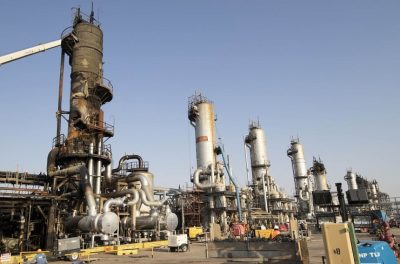Has Saudi Arabia Once More Made a Catastrophic Oil Blunder?

In March of this year Saudi Arabia launched what was clearly a catastrophic move to regain its role as the world oil superpower. What initially was a move aimed at taking markets away from Russia, after the latter declined to make further production cuts, has quickly turned into a clumsy even catastrophic repeat of the Saudi 2014 oil miscalculation. At this point US shale oil industry is indeed hurting as a result. However, OPEC and Saudi Arabia are themselves in a deep crisis whose outcome may radically transform the geopolitical power map of oil.
 In the early days of March just as the coronavirus pandemic shutdowns were spreading across Europe, the Middle East and North America, a Vienna OPEC ministers meeting discussed how to stabilize world oil prices amid falling economic demand. Saudi Arabia as the strongest voice in OPEC essentially called for Russia to take the bulk of added proposed output cuts of some 300,000 barrels daily, something Russia politely but firmly declined.
In the early days of March just as the coronavirus pandemic shutdowns were spreading across Europe, the Middle East and North America, a Vienna OPEC ministers meeting discussed how to stabilize world oil prices amid falling economic demand. Saudi Arabia as the strongest voice in OPEC essentially called for Russia to take the bulk of added proposed output cuts of some 300,000 barrels daily, something Russia politely but firmly declined.
At that point, on orders from Saudi de facto monarch, Prince Muhammad bin Salman, Saudi embarked on an aggressive strategy of price dumping its oil on especially European markets to undercut Russian sales. The upshot, as the price war continued, was the worst collapse in oil prices since the Saudi 2014 failed strategy to bankrupt the US shale oil industry.
What Saudi strategists did not calculate was a pandemic response beginning mid-March that would bring oil demand to new lows as air travel virtually stopped along with much auto and truck transport. In 2016 as the Saudi low pricing war against US shale oil proved disastrous bringing oil from $100 a barrel to below $30, Russia agreed for the first time, as the world’s largest oil producer, to join with Saudi-led OPEC to cut oil production by some 2 million bpd. Prices then began a slow recovery.
The problem is that the US shale oil sector recovered as well, with astonishing success as the US in the past two years has become the world’s largest oil producer. This time with a weakening world economic growth evident already in late 2019, before the “corona depression,” the Saudis again badly miscalculated as world oil prices went into free fall. Within two days of the Saudi announcement of modest 10% price cuts, oil traders pushed prices down by 20% to 30%. Instead of correcting a disastrous strategy, Saudis doubled down in a move that can only be called historic, by announcing a 25% increase in production, to 12.3 million barrels a day, flooding a saturated oil market and collapse in global demand with surplus oil. Russia announced it would respond by boosting its production as well.
What the Saudis ignored in their calculation was something unprecedented. As the world, from China to Iran to Italy to the USA, simultaneously went into coronavirus lockdown, world oil demand disappeared overnight. No planes were flying meaning no demand for jet fuel. No cars were driving as people were told to stay at home. The world economy ground to a screeching halt.
One day in early May as options expired, oil prices briefly went into minus as traders were forced to pay to get rid of their oil over-extremely scarce storage space, particularly at a key hub in Cushing, Oklahoma.
Ignominious retreat
Finally in early May, in a desperate bid in damage control, Saudi Arabia and the OPEC producers agreed with Russia to jointly cut an unprecedented 9.7 million barrels daily from output to revive prices. The result has been a weak recovery in the price of West Texas Intermediate crude oil, the benchmark for US shale oil, to around $40 a barrel, a price near or below breakeven for many US shale oil producers. For the June month OPEC total oil production fell to a three-decade low of less than 23 million bpd. Russia and OPEC have agreed to extend the production cut until end-July when they hope to see economic recovery and rising demand. That will most certainly be wishful fantasy.
China, the world’s largest oil importer just announced it was near limits of storage space for more oil, despite the low prices. That suggests if OPEC and Saudi believe they can rapidly return to pre-March production they may have a shock. As well, the world economy is descending into a Covid19 depression which at this point, despite state stimulus, is preprogrammed to only get worse which means collapsed global oil demand going forward. For the Saudi budget to be in balance the Kingdom needs an oil price of from $70 to $90 a barrel. Instead prices below $30 look more realistic now. Prolonged world oil depression will have severe consequences for Saudi ability to fund peace at home let alone abroad in its running conflict with Iran or Qatar.
In the USA the shale industry has been responding as the corona lockdowns continue. In recent weeks a sudden covid19 cases upsurge, some say politically-motivated in part, has led to many states such as Texas and California into re-imposing lockdown. That is leading to further drop in oil demand. The US active oil drilling, the rig count, at end of June had dropped to a new low of 278 rigs, a drop of 72% from a year ago and 65% since the Saudi March oil war was launched. Industry sources expect this to stay low until at least 2021.
This however, even as US oil output slows, will bring little good news to OPEC and Saudi Arabia. The world oil market is collapsing and to imagine a return to normal as a new alarm in the USA and China over Covid19 cases is pure wishful thinking. As Saudi tries to raise prices and increase output, it will intersect a world oil demand that is contracting as never before in the post-1945 era. As events in 2014 made clear the death of the US shale oil industry is far from certain. Wells can be reopened quickly. Further Russia has less reason to side with OPEC this time.
All this is having a huge impact on not only Middle East oil geopolitics, but of the world. Saudi Arabia’s ongoing proxy war against Iranian influence in Syria and Iraq and Lebanon is being severely undercut. The Saudi proxy war backing Egypt against Turkey in Libya similarly faces severe problems of finance going forward. The fallout from the disastrous March oil war is only beginning.
*
Note to readers: please click the share buttons above or below. Forward this article to your email lists. Crosspost on your blog site, internet forums. etc.
F. William Engdahl is strategic risk consultant and lecturer, he holds a degree in politics from Princeton University and is a best-selling author on oil and geopolitics, exclusively for the online magazine “New Eastern Outlook” where this article was originally published. He is a Research Associate of the Centre for Research on Globalization.
Featured image is from NEO
Seeds of Destruction: Hidden Agenda of Genetic Manipulation
- Author Name: F. William Engdahl
- ISBN Number: 978-0-937147-2-2
- Year: 2007
- Pages: 341 pages with complete index
List Price: $25.95
Special Price: $18.00
This skilfully researched book focuses on how a small socio-political American elite seeks to establish control over the very basis of human survival: the provision of our daily bread. “Control the food and you control the people.”
This is no ordinary book about the perils of GMO. Engdahl takes the reader inside the corridors of power, into the backrooms of the science labs, behind closed doors in the corporate boardrooms.
The author cogently reveals a diabolical world of profit-driven political intrigue, government corruption and coercion, where genetic manipulation and the patenting of life forms are used to gain worldwide control over food production. If the book often reads as a crime story, that should come as no surprise. For that is what it is.


